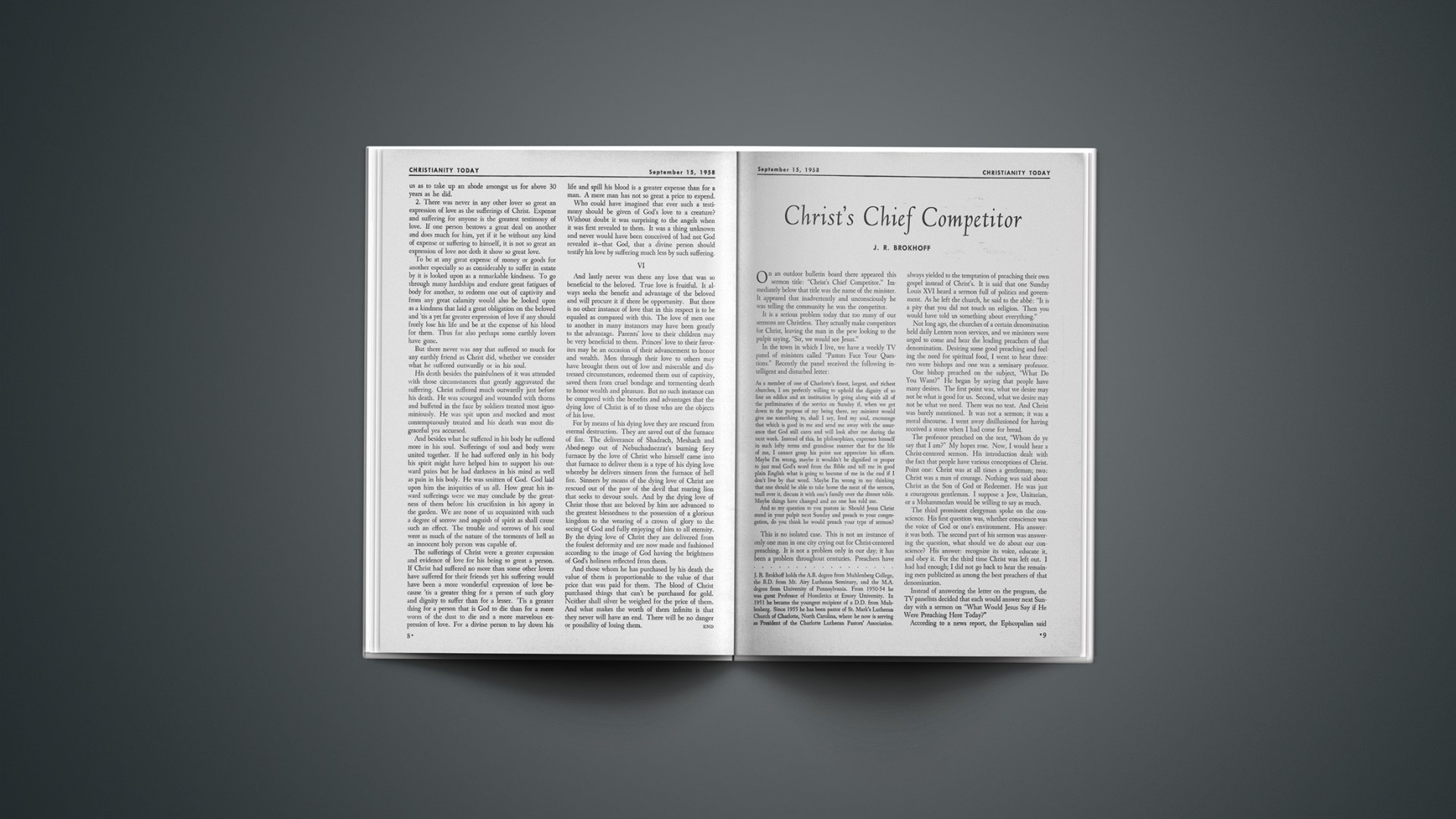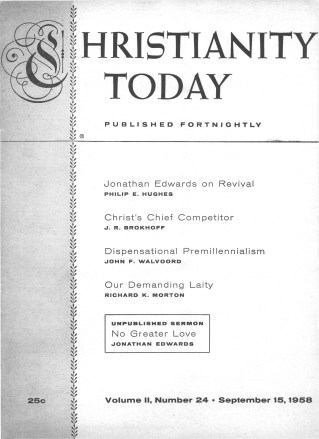On an outdoor bulletin board there appeared this sermon title: “Christ’s Chief Competitor.” Immediately below that title was the name of the minister. It appeared that inadvertently and unconsciously he was telling the community he was the competitor.
It is a serious problem today that too many of our sermons are Christless. They actually make competitors for Christ, leaving the man in the pew looking to the pulpit saying, “Sir, we would see Jesus.”
In the town in which I live, we have a weekly TV panel of ministers called “Pastors Face Your Questions.” Recently the panel received the following intelligent and disturbed letter:
As a member of one of Charlotte’s finest, largest, and richest churches, I am perfectly willing to uphold the dignity of so fine an edifice and an institution by going along with all of the preliminaries of the service on Sunday if, when we get down to the purpose of my being there, my minister would give me something to, shall I say, feed my soul, encourage that which is good in me and send me away with the assurance that God still cares and will look after me during the next week. Instead of this, he philosophizes, expresses himself in such lofty terms and grandiose manner that for the life of me, I cannot grasp his point nor appreciate his efforts. Maybe I’m wrong, maybe it wouldn’t be dignified or proper to just read God’s word from the Bible and tell me in good plain English what is going to become of me in the end if I don’t live by that word. Maybe I’m wrong in my thinking that one should be able to take home the meat of the sermon, mull over it, discuss it with one’s family over the dinner table. Maybe things have changed and no one has told me.
And so my question to you pastors is: Should Jesus Christ stand in your pulpit next Sunday and preach to your congregation, do you think he would preach your type of sermon?
This is no isolated case. This is not an instance of only one man in one city crying out for Christ-centered preaching. It is not a problem only in our day; it has been a problem throughout centuries. Preachers have always yielded to the temptation of preaching their own gospel instead of Christ’s. It is said that one Sunday Louis XVI heard a sermon full of politics and government. As he left the church, he said to the abbé: “It is a pity that you did not touch on religion. Then you would have told us something about everything.”
Not long ago, the churches of a certain denomination held daily Lenten noon services, and we ministers were urged to come and hear the leading preachers of that denomination. Desiring some good preaching and feeling the need for spiritual food, I went to hear three: two were bishops and one was a seminary professor.
One bishop preached on the subject, “What Do You Want?” He began by saying that people have many desires. The first point was, what we desire may not be what is good for us. Second, what we desire may not be what we need. There was no text. And Christ was barely mentioned. It was not a sermon; it was a moral discourse. I went away disillusioned for having received a stone when I had come for bread.
The professor preached on the text, “Whom do ye say that I am?” My hopes rose. Now, I would hear a Christ-centered sermon. His introduction dealt with the fact that people have various conceptions of Christ. Point one: Christ was at all times a gentleman; two: Christ was a man of courage. Nothing was said about Christ as the Son of God or Redeemer. He was just a courageous gentleman. I suppose a Jew, Unitarian, or a Mohammedan would be willing to say as much.
The third prominent clergyman spoke on the conscience. His first question was, whether conscience was the voice of God or one’s environment. His answer: it was both. The second part of his sermon was answering the question, what should we do about our conscience? His answer: recognize its voice, educate it, and obey it. For the third time Christ was left out. I had had enough; I did not go back to hear the remaining men publicized as among the best preachers of that denomination.
Instead of answering the letter on the program, the TV panelists decided that each would answer next Sunday with a sermon on “What Would Jesus Say if He Were Preaching Here Today?”
According to a news report, the Episcopalian said that if Jesus was standing in his pulpit that morning, he would give the Beatitudes. The Baptist said that Jesus would speak clearly, but uncomfortably, about the vices of the day. The Methodist declared that Jesus would urge members of the congregation to forgive each other. The Presbyterian minister would have Jesus preach three points: judgment, love, and joy.
We sadly note here that these ministers would have Jesus Christ giving “Christless preaching.” The ethics of Jesus was one-sidedly applied to personal and social needs and problems. But what is most subtle is the impression that Jesus would only speak from the pulpit the one Sunday that he was allowed. Is not Jesus to speak every Sunday? Should not each Sunday’s sermons be centered in and saturated with his truth? What does it mean to preach Christ Sunday after Sunday? First, it means that Christ should be lifted up that the congregation may see him. People would hear his words, see his deeds once again, and sense his spirit.
To preach Christ means to keep the cross in the center of our preaching. Jesus is much more than a man or a martyr; he is not a mere teacher of principles or a moral guide. It is his atoning death that is significant: he died for our sins; by and in him we have redemption; and through him God and man were made one. In each sermon there ought to be enough of the cross that a stranger in church for the first time would find the answer to the question: “What must I do to be saved?” Paul said, “We preach Christ crucified.”
In preaching Christ Sunday after Sunday there is a danger that we give the impression Jesus was merely an historical figure among many. He once lived and died on a cross. We neglect the resurrection except for Easter, and even then we use the occasion for assuring people of pagan ideas of immortality. But why is not the resurrection kept in every sermon throughout the year? It is assurance to our people that Christ is a contemporary Saviour, a present, living reality.
Fortifying Our Own Ideas
Why do we preachers remove Christ from our sermons? To be sure, we do not drop him completely; he is used as an illustration, and often we quote him to fortify our own ideas. We have Christless, crossless sermons because we fail to realize the true meaning of Christ. Christ above all is Redeemer and Saviour. He is the Lamb of God that takes away the sin of the world. His death and resurrection have opened up the gates of eternal life for all who accept him in faith. This is tragically left out of many sermons. Why?
Probably because we misunderstand and under-evaluate the importance of the sermon. To be popular with people and fill the pews every Sunday, we feel it necessary to entertain with humorous anecdotes and illustrations. On the other hand, we also have a sincere desire to make Christianity applicable to the needs and problems of the day. Consequently, we discuss from a Christian viewpoint politics and economics.
What is the place and significance of the sermon? This takes us to the heart of our Protestant faith. It lies in the doctrine of the Word. The means of grace are the Word and the Sacraments. The Sacraments are the Word with a visible sign. The Word comes to us every Sunday as it is preached from the pulpits of our land. The sermon is a sacramental aspect of worship, a means of grace. It is God making his appeal through the preacher. Through the sermon, God sends his grace upon his people by which they are saved and brought into a right relationship with Christ.
Where does Christ come in? A sermon is the declaration of the Word of God. What is the Word? According to John’s gospel, “the Word was God” and “the Word was flesh and dwelt among us.” Christ is the Word. To preach Christ is to preach the Word. But Christ is not preached fully except he is preached as the crucified and risen Saviour.
There is a painting of Luther preaching to a congregation. The people are not looking at Luther but at another spot in the church. A second look at the canvas shows the ethereal figure of Christ in a corner of the cathedral. The congregation is looking at Christ. The ideal situation for every preacher and congregation should be to preach Christ so fully and faithfully that the congregation will not see a master orator in the pulpit, but Jesus Christ, our Saviour and Redeemer.
As pastors go into their pulpits every Sunday, they should hear a plea from the pews: “Sir, we would see Jesus.” Are preachers today competitors or confessors of Christ?
On Friendship
What shall we say of friendship,
That timeless span of life
When mind meets mind
In selfless communion of the soul.
It is but a symbol, ’tis true
Of unsaid words, of songs
As yet unheard amid the noise
And tremor of earth-bound places.
It is not seen, nor is it found
In frenzied mind. It is only
In a quiet hour, when need
Rears its ugly head, that we
Turn, wordless, to find a hand
Within our own, warm and unafraid.
LOLA J. PEPLER
J. R. Brokhoff holds the A.B. degree from Muhlenberg College, the B.D. from Mt. Airy Lutheran Seminary, and the M.A. degree from University of Pennsylvania. From 1950–54 he was guest Professor of Homiletics at Emory University. In 1951 he became the youngest recipient of a D.D. from Muhlenberg. Since 1955 he has been pastor of St. Mark’s Lutheran Church of Charlotte, North Carolina, where he now is serving as President of the Charlotte Lutheran Pastors’ Association.










